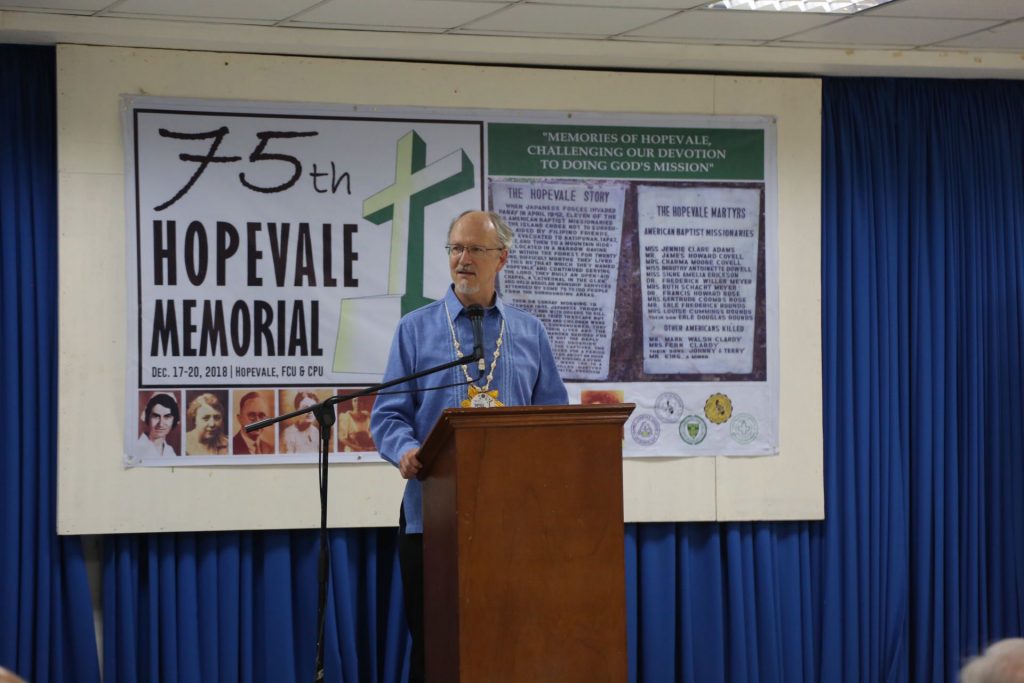Hopevale – from death to new life
Now that the new year has well and truly started, we hope and pray you see God at work in and through you today and during 2019. This is our daily prayer for our lives and ministries, and those of the partner organizations we work with here in the Asia-Pacific region.
I (Bruce) certainly saw God at work when I was in the Philippines in December. The Convention of Philippine Baptist Churches (CPBC) held a series of events to commemorate the 75th anniversary of what happened at a place called Hopevale, a remote valley located in the center of Panay Island. It was there that 11 American Baptist missionaries, one of their children, and four other American citizens hid for 18 months until they were found and executed by Japanese troops on December 20, 1943 at the height of World War II. The story of these missionaries’ contribution to CPBC churches, schools, hospitals, and seminaries, the dedication that led them to stay in the Philippines even after Japan invaded, and the support of Filipino Baptists who risked their lives to care for the missionaries may be largely forgotten in American Baptist churches – but it is very much alive in the CPBC.
I was part of a delegation of international visitors who were invited to join Philippine Baptists for events in Iloilo City, Hopevale itself, and Roxas City over a period of four days. One of those events was a panel presentation called “Gleanings of Hope” offered in Iloilo and Roxas – I was invited to share some reflections about the Hopevale story as a panel member. I’d like to share with you some of the thoughts I offered then.
When Ann and I responded to God’s call to serve as missionaries of the American Baptist Foreign Mission Society in 1986 (ABFMS; now referred to as International Ministries-ABCUSA) the Society’s original seal made a deep impression on us. The simple line drawing shows a bull next to a plow and smoke rising from an altar with the words “Ready for Either.” The message was clear: being a cross-cultural missionary means being ready to live a life of service and sacrifice.
The ABFMS Seal
We gained a deeper understanding of that message when we were invited to serve by Central Philippine University and the CPBC where we learned of the Hopevale story from those who had played a part in it. When we hiked in to Hopevale with 8-year-old Elena and 1-year-old Asa to participate in the 50th-anniversary commemoration, the story became even more real for us. What happened before, during and after those events reminds me that service and sacrifice are required of all who aspire to be disciples of Jesus. It also reminds me that sometimes those two themes are blended in surprising ways by the God who heals all wounds.
Hundreds hiked in to Hopevale Baptist Church for the 75th anniversary
Where do we find “gleanings of hope” in the Hopevale story? Our first response when confronted by disaster, death and the apparent triumph of evil is to ask “why?” We ask “why?” not just about those events 75 years ago, but about events in our own and our families’ lives. Why did this happen? Why them? Why us? Why me?
Bruce spoke on the “Gleanings of Hope” panel
As I struggle with these questions – especially now in the context of Hopevale – these are a few of my reflections:
We live in a world where our relationships with God, ourselves, each other, and God’s creation are twisted by rebellion against God. Evil is at work in our world: people, institutions and even the weather can cause terrible things to happen that do not reflect God’s will. The causes and consequences of war both 75 years ago and today remind us that we live in a fallen world.
Following Jesus and being an obedient disciple comes with a cost. This Scriptural truth is in stark contrast to the heresy some today call the “prosperity gospel,” which is really no gospel at all.
Our view of God’s action and God’s plan is limited, and it may take years to receive even partial answers to our question “why.” Sometimes this question may not even be answered to our satisfaction in our own lifetimes.
The grand context and lesson of the Hopevale story, and indeed of our own lives, is that the mission of God in the world is to restore, redeem and reconcile this fallen creation in which we play a part. God is always in the healing business. And as incredible as it may seem, the Creator of the universe invites us to cooperate in that mission.
If we are to glean any hope from the Hopevale story, perhaps it is this: we who aspire to be disciples of Jesus are “wounded healers” in the words of Henri Nouwen. Perhaps God’s response to our question “why” is a new question: “how?” How can God use us in our brokenness to be agents of reconciliation and healing in a world distorted by sin and separation?
This ministry update is longer than our usual, but we hope it offers you a chance to reflect on the crucial question “how?” How can you be God’s agent of hope, healing, and wholeness today for someone in the very place God has put you? We’re grateful for the opportunities we have here in the Asia-Pacific region to encourage and equip God’s people as “wounded healers” ourselves. Thank you for being part of that ministry, and for supporting us with your prayers and financial gifts.
Ngā mihi nui.
Rock foundations are all that remains of the “Cathedral in the Glen” constructed by the missionaries as a place of worship 75 years ago




